Books
Books
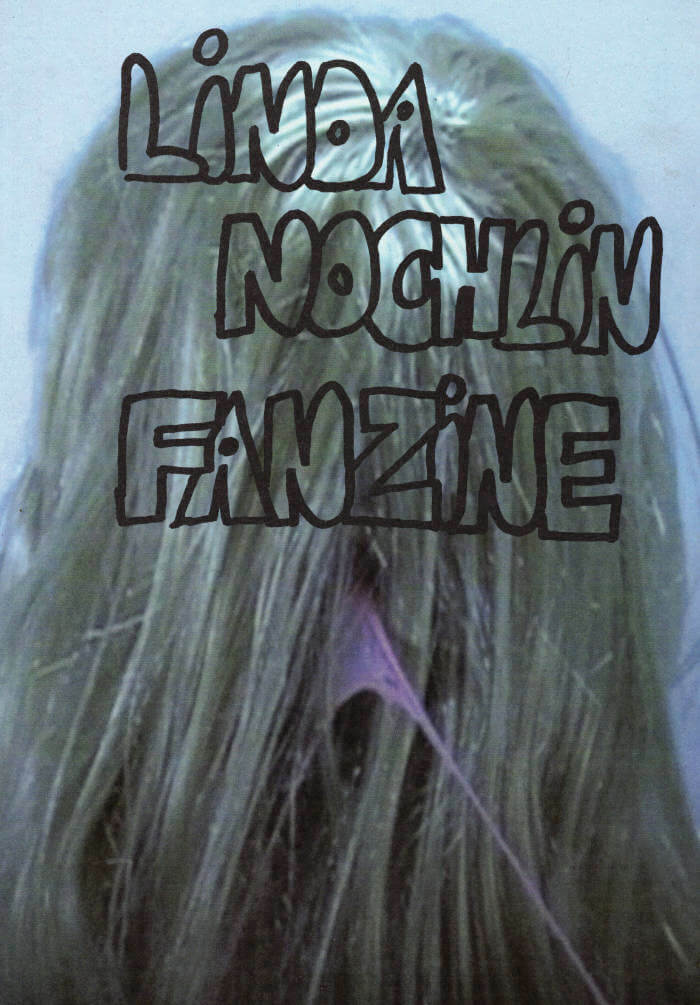
Linda Nochlin Fanzine
More than 130 artists and authors from different generations participated in 2021 in an open call to mark the 50th anniversary of Linda Nochlin's essay, Why Have There Been No Great Women Artists? This resulted in four digital fanzines that we now turned into a fierce publication in the tradition of the first feminist print work. Chloé D'hauwe took care of the no fuzz design.
Editors: Els Roelandt and Jessica Gysel
Texts: Olave Nduwanje and Delphine Bedel (ao)
Translations: Irene de Craen en Euphemia Ophelders
Design: Chloé D’hauwe
Cover: Christine Clinckx, Penelope, video still 2004
Print: Antilope de Bie Printing, Duffel
Riso: Risiko Press, Borgerhout
Year: 2022
Amount of pages: 228
Dimensions: 28 x 21 cm
Edition: 600 copies
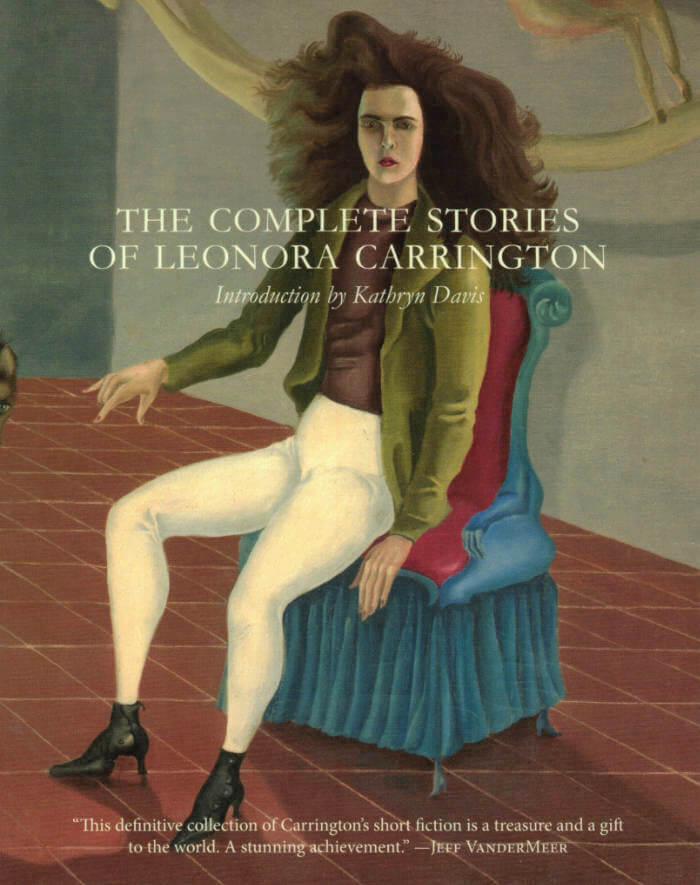
The complete stories of Leonora Carrington
Surrealist writer and painter Leonora Carrington (1917-2011) was a master of the macabre, of gorgeous tableaus, biting satire, roguish comedy, and brilliant, effortless flights of the imagination. Nowhere are these qualities more ingeniously brought together than in the works of short fiction she wrote throughout her life.
Published to coincide with the centennial of her birth, THE COMPLETE STORIES OF LEONORA CARRINGTON collects for the first time all of her stories, including several never before seen in print. With a startling range of styles, subjects, and even languages (several of the stories are translated from French or Spanish), THE COMPLETE STORIES captures the genius and irrepressible spirit of an amazing artist's life.
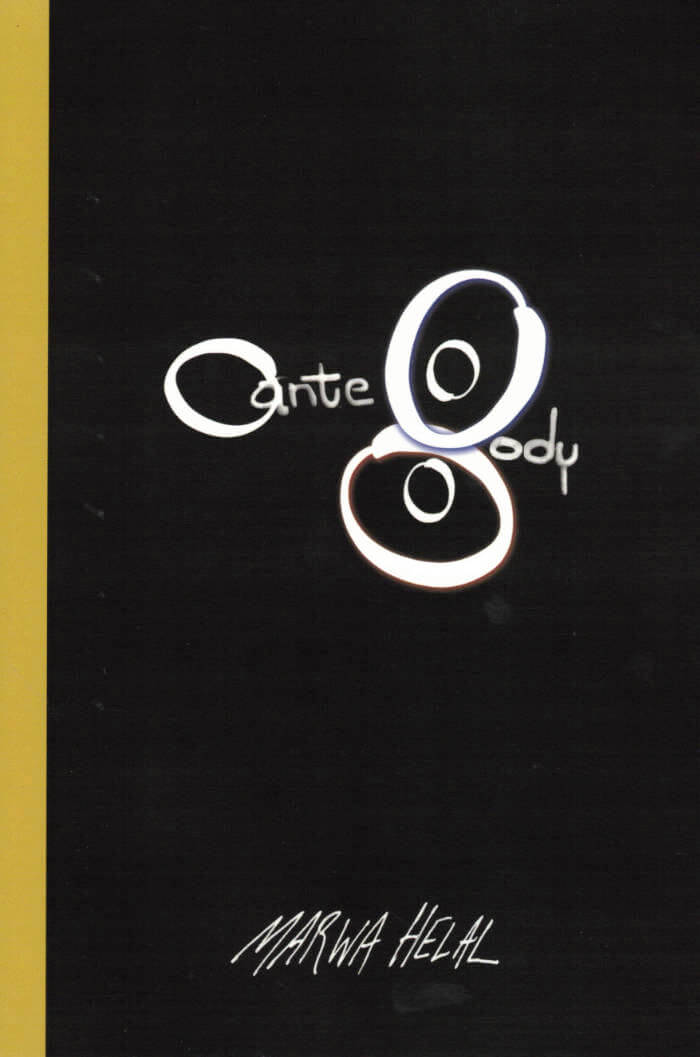
Ante body
An incisive poetic sequence that tracks the relationship between migration and complex traumas in this unsparing critique of the unjust conditions that brought us the global pandemic.
Ante body is a poetics of [un]rest. A project that started as an exploration of how the psychological impacts of migration and complex traumas manifest as autoimmune disease and grew into a critique of the ongoing unjust conditions that brought on the global pandemic. Continuing her use of the invented poetic form, the Arabic, and integrating Fred Moten's concept of "the ANTE," Helal creates an elliptical reading experience in which content and form interrogate the inner workings of patriarchy, capitalism, nationalism, and globalism.
Marwa Helal is the author of Ante body (Nightboat Books, 2022), Invasive species (Nightboat Books, 2019) and the chapbook I AM MADE TO LEAVE I AM MADE TO RETURN (No, Dear, 2017).

Cold Heaven
Cold Heaven joins two plays, Sometimes Dead is Better and Bye Bye Brunhilde, with an introduction by the author. Both plays have the dissonant, radical beauty of poetry.
As Roy writes in her Introduction to the book: “Plays are porous, written to be entered… Plays provide a frame for studying collisions… Language can be an (uncontrollable) character, moving in on the others, creating a stir… [I]n a play… the private self disappears. Writing can move out into the dead zone between any two people and test what is there.”
Imagine a Punch and Judy as lesbians whose domestic and sexual squabbles are paraded in the language of brilliant poets; these are Camille Roy's Fear and Technique. A wonderful play.
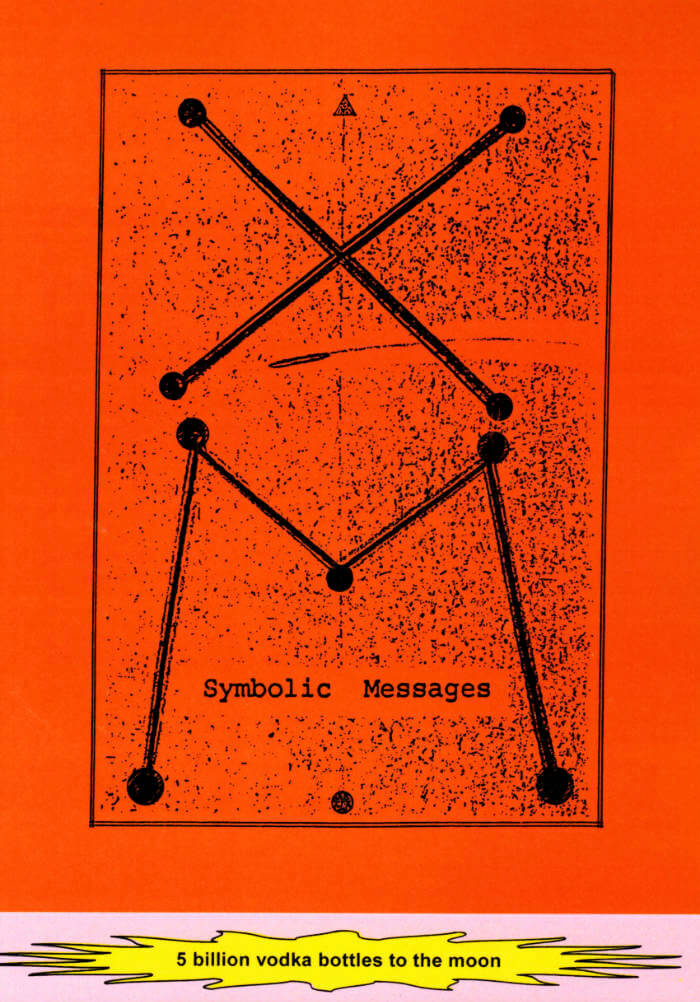
Symbolic Messages - An Introduction to a Study Of "Alien” writing.
Mario Pazzaglini, Moritz Appich and 2 more
This book is a reprint from a scan of what appears to be the last remaining copy of Symbolic Messages in public libraries worldwide, at the university library of Manitoba College, Canada. Clinical psychologist Mario Pazzaglini first published his extensive collection of case studies in alien writing and received scripts in 1991. This book is a photocopy of the original edition. Editorial manipulations of the material are minimal and where they have been made, it was from lack of information or else for reasons of practicality and cost efficiency: There is no solid evidence of the original binding, printing technique, paper, etc. The original book seems to have been layed out in American letter format and has been scaled down to fit the proportions of European ready-to-order print formats and provide easier readability. Apart from these minor adjustments, the copy is as faithful to the original, as possible.

Sun of an Ignored Putrid Productivity
Bárbara Acevedo Strange, Eva Tatjana Stürmer
Sun of an Ignored Putrid Productivity is a speculative novel about the influence of artificial intelligence and accelerating technological progress on our human interactions. The dialogical script is based on personal reflections and pop-cultural, scientific and philosophical references from the beginnings of cybernetics to more recent voices. Randomly generated, constructed and quoted contents cannot be distinguished from each other. The borderline between fact and fiction becomes blurred. What is left is a flickering effect, disorientation, which reflects our perception of reality under conditions of never-ending information overflow.

Yes, I Am A Destroyer
I travel far across the city, cut it knowingly, concealing behind me the entrances to tunnels, altering the signage. I traverse the grimiest bowels, skirt the farthest wettest edges like a silverfish active only in the hallucinatory hours, to avoid becoming known, to avoid any collusion between my body and theirs, its.
Under the neon sky of a sick city, which might be London, a nameless governess oscillates between lucidity and dissociation, solitude and communication, wage labour and escape attempts. A wild and unreliable narrator-without-character—ardent, delirious, complicit, vengeful, and paranoid—she embodies a perverse and chaotic resistance. Simultaneously demonic and angelic, both maniacal and generous in her fury, accidentally elegant, tongue tied and barbed, she veers towards defiance as devotion. An anti-Bildungsroman in the collapsing first person, Yes, I Am A Destroyer is an unbecoming record of memory and forgetting, of a relentless undoing.
‘Any girl who learns how to read is already a lost girl, wrote the infamous confessionalist Rousseau. But if that lost girl, with insatiable pronoun, bastard spawn perhaps of the exiled Genevan, palmed a pen and confessed—how would that read? What can she know? With relentless intelligence and urgent prosody, Mira Mattar shows us. She invents a narrator in the raging anti-tradition of Violette Leduc and Albertine Sarrazin, leaps beyond the cloying contract of capital with the feminine, of intimacy with violence, to animate a lush document of the refusal of subjection. Much like the young Jean-Jacques, she’s a tutor underpaid for her sensitivity. She is, like him, a thief of small things, a sponge for the edifying comportments of the employing class. What she makes of her servitude—a fabulously grotesque encyclopedia of sensing—is dedicated to female anger. Scrubbing, washing, chewing, frigging, barfing, stealing, moisturising, shitting: every surface, every gesture, is appropriated to her bodily resistance. ‘Live anyway’ is her stoic motto. This glorious tract ends with a call for the anarchical vigour of the animal body we share. Read it and flourish. You will perhaps be invoiced.’
–> Lisa Robertson
Mira Mattar writes fiction and poetry. She is an independent researcher, editor, and tutor. A Palestinian/Jordanian born in the suburbs of London, she continues to live and work there. She has read and published her work widely. Yes, I Am A Destroyer is her first book.

Entertaining Ideas (The Long View)
Imagine that we too (imagine that I too), wanted to welcome ideas, to attend to them, to take care of them, to make sure they have a good time. Imagine that I too wanted to be a good hostess to writing ideas. How to be open to them, how to be alert to them—so that I know how and when to let them in?
ENTERTAINING IDEAS began as a reading exercise: an effort to perform a ‘good reading’ of Elizabeth Jane Howard’s The Long View(1956), and to think about what a ‘good’ short reading of a long novel might mean, what it might look like or read like. As a translator, Kate Briggs accepts that writing out a reading involves change, tampering with what seems perfect, and doing so from necessity, as a way of learning how exactly it works. She has changed Howard’s book. Her exercise changed too, expanding unexpectedly into a set of reflections on writing backwards, living forwards, and entertaining ideas.
‘Kate Briggs generously shares with us her unique and delicately revolutionary way of reading; the moment where writing becomes the only way to grasp our slippery thoughts and desires. This book is pure joy.’
– >Alejandro Zambra
Kate Briggs is a writer and translator based in Rotterdam, NL. She is the translator of two volumes of lecture and seminar notes by Roland Barthes (Columbia University Press, 2011 and 2013). Other publications include:Exercise in Pathetic Criticism (Information as Material, 2011), On Reading as an Alternation of Flights and Perchings (NO Press, 2013), and The Nabokov Paper (Information as Material, 2013). This Little Art, a long essay on the practice of translation, was published by Fitzcarraldo Editions in 2017.
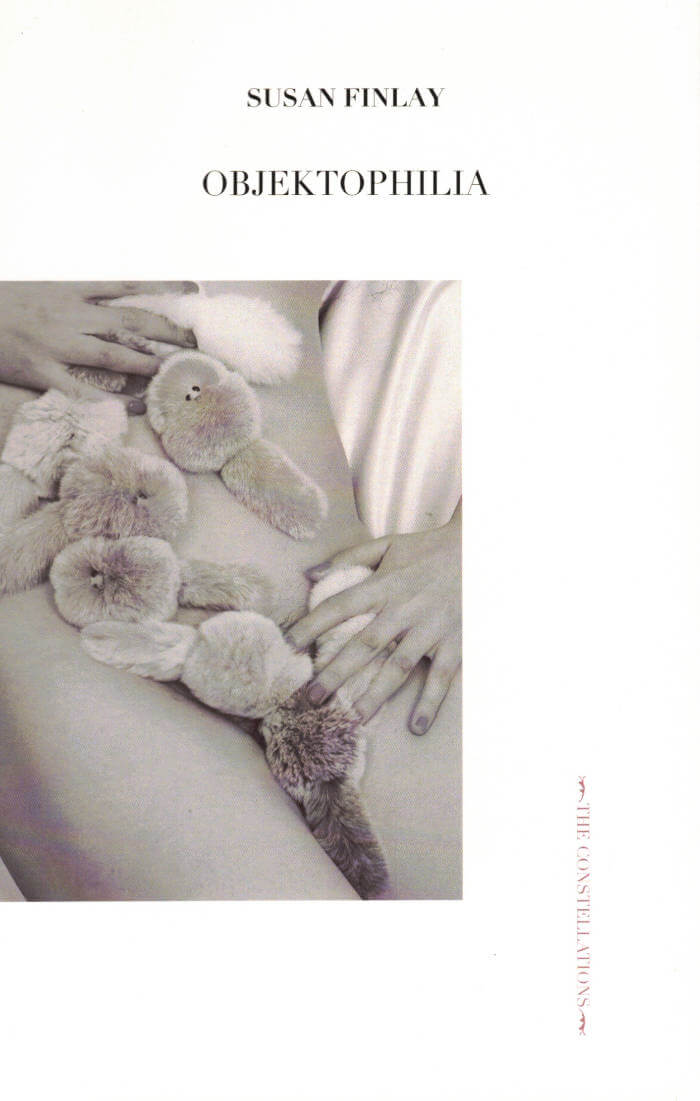
Objectophilia
Design classics, the dates of which ranged from the beginnings of the previous century to the start of the current one, were scattered throughout the room, their very definite shapes offset against the off-white, off-modern walls. I allowed my gaze to flit from one piece of furniture to the next, and as I mentally joined the dots between them I unwittingly re-wrote their history according to thematic as opposed to chronological concerns. I wondered if perhaps I were simply seeing my own flat ‘in the expanded field’, each element repositioned by some new and typically rabid curator eager to facilitate the production of their own dense texts...
Part metafiction, part design criticism, with a touch of armchair psychoanalysis, Objektophiliabegins in London in 2014, where a nameless design critic and her partner X reside in a decrepit but Grade II listed tower block. It ends some months later among the fin de siècle wonders of Vienna in an echo of the successive encounters of Schnitzler’s La Ronde. Possessed by the ruins of social housing and its accompanying ideologies, but nonetheless in possession of those ruins’ original brushed-steel light-fittings, the critic soon discovers that her craving for these and similarly ‘undemanding things’ has usurped her more conventional—or fleshly—desires.
‘Susan Finlay’s deft, subtle work examines the psychic texture of life through our relation to things... objects of all kinds, from Filet-O-Fish sandwiches to high art, Le Creuset cookware, bicycle baskets and purpose-built, modern flats. Objektophiliais witty and brisk and devastating all at the same time.’
–> Chris Kraus
Susan Finlay is a writer and artist. She is the author of three poetry pamphets: Indole, 2019, The Unruly Glove, the Green Bum and the Sickly Trickle(2018), and Sex and the City 2 (2017), and two previous novels: Our Lady of Everything(Serpent’s Tail, 2019), and Arriviste (Five Lines in the Sand, 2007). Most (but not all) of her work relates to psychoanalysis, magic, and the decorative arts. She lives in the UK and Berlin.

Future Imperfect
Then let the story really begin in 1968, though it has little to do with May. By chance it opens in January of that year, and it really concerns me rather than the world of political events, though these are always on my mind, as they were always on my mind. Its antecedents are in the summer of 1967, when I lived, happily, in a squalid bedsit in the then squalid Ladbroke Square, as well as in some basement maid’s room in the West End, and did my secondary sources in the British Library, the V&A, and also, a bit, in Paris, Bordeaux, and Montauban, though that was to flirt with the primary sources ahead of time.
This short Bildungsroman sets beside each other the fault lines of events and moments recalled without a diary with the verification and sometimes undermining effects of new research of materials, the recovery of what was known, what might have been known, and what was merely probable, as if this were a history of the history of art.
‘This is an extraordinary journey. Using ekphrasis as method—and as a proper timeline for an indefinite confinement—it wanders through a lived calendar of scholarship, where forgotten stories of art history books flirt with library indexes and archival catalogues, and streetwalking meets gay longing at the heart of the text.’
– Élisabeth Lebovici
Adrian Rifkin worked in art departments as a historian and a studio tutor, in historical and cultural studies as well as visual culture, from Portsmouth Polytechnic in 1970 to Goldsmiths, University of London in 2012, where he was a professor of Art Writing. A collection of essays, Communards and Other Cultural Histories, edited and introduced by Steve Edwards, was published in 2017. Interdisciplinary Encounters, Hidden and Visible Explorations of the Work of Adrian Rifkin, edited by Dana Arnold, appeared in 2015.

Unable To Achieve Broad Recognition In My Lifetime, I Laboured In Obscurity Until My Death Last Year
For nearly two years the author collected phrases from the exhibition press releases she received through email, posting certain of them on Facebook in a rather unsystematic way (that is to say, when she felt like it), with only one change, that of the personal pronoun, so each statement appeared vainglorious, absurd, even tragic. She supposes the measure was if they made her laugh or gasp or used words she deplores when thinking or writing about art. The posts gathered quite a following. Some people still mention them to her, and others have asked her to look at their own press releases before circulation.
These extracts have provoked laughter, disbelief (especially when performed as public readings, when she has been obliged to swear to their veracity), self-recognition, and yes, shame.
She had only three rules: 1) She would not quote the press release of anyone she knows (certainly she could have done—she must admit that both a friend and someone she dislikes intensely have slipped in, and she fervently hopes neither ever reads this book); 2) She would not alter anything except the pronoun (this is largely true; however, for this book, she corrected some errors of punctuation and spelling, changed spellings to their English form, and employed her beloved Oxford comma); and 3) She would not use anything the artist had written (this, too, is true, save for one exception that was too wonderful not to include).
Finally, she gathered a collection of endorsements, some along the way, others when she indicated this work was done. She is still alive and she continues to labour in obscurity.

Archive Dora Diamant #4
A collection of photographs from the archives of the icon of underground and alternative Parisian nights Dora Diamant.
A self-taught photographer, Dora Diamant has left thousands of photos. The Dora Diamant Association, custodian of this archive, and Éditions L'Amazone have joined forces to bring them to life by devoting a series of publications to them. Each volume of the Dora Diamant Archive was created by a different person and is the result of a subjective selection and arrangement specific to its author.
Photos: Dora Diamant
Sélection: Sonia DeVille
Dessin: Marilou Chabert
Edité par Archive Dora Diamant, Paris & Editions l'Amazone, Bruxelles, 2022
1ère édition - 300 exemplaires
Format 18 x 26 cm - 30 pages
Papier Magno Gloss 150g - couverture 300g

Archive Dora Diamant #3
A collection of photographs from the archives of the icon of underground and alternative Parisian nights Dora Diamant.
A self-taught photographer, Dora Diamant has left thousands of photos. The Dora Diamant Association, custodian of this archive, and Éditions L'Amazone have joined forces to bring them to life by devoting a series of publications to them. Each volume of the Dora Diamant Archive was created by a different person and is the result of a subjective selection and arrangement specific to its author.
Photos: Dora Diamant
Sélection & dessin: Apollo Thomas
Edité par Archive Dora Diamant, Paris & Editions l'Amazone, Bruxelles, 2022
1ère édition - 300 exemplaires
Format 18 x 26 cm - 60 pages
Papier Magno Gloss 150g - couverture 300g
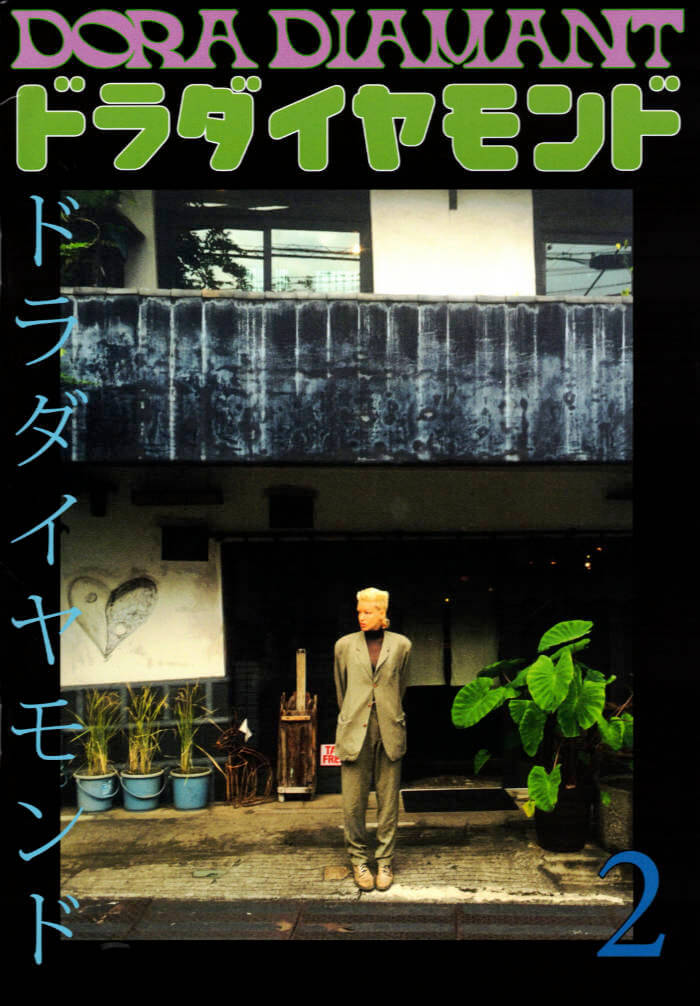
Archive Dora Diamant #2
A collection of photographs from the archives of the icon of underground and alternative Parisian nights Dora Diamant.
A self-taught photographer, Dora Diamant has left thousands of photos. The Dora Diamant Association, custodian of this archive, and Éditions L'Amazone have joined forces to bring them to life by devoting a series of publications to them. Each volume of the Dora Diamant Archive was created by a different person and is the result of a subjective selection and arrangement specific to its author.
Photos: Dora Diamant
Sélection: Carlotta & Valentine Bailly-Borg
Dessins: Carlotta Bailly-Borg
Edité par Archive Dora Diamant, Paris & Editions l'Amazone, Bruxelles, 2022
1ère édition - 300 exemplaires
Format 18 x 26 cm - 64 pages
Papier Magno Gloss 150g - couverture 300g

Archive Dora Diamant #1
A collection of photographs from the archives of the icon of underground and alternative Parisian nights Dora Diamant.
A self-taught photographer, Dora Diamant has left thousands of photos. The Dora Diamant Association, custodian of this archive, and Éditions L'Amazone have joined forces to bring them to life by devoting a series of publications to them. Each volume of the Dora Diamant Archive was created by a different person and is the result of a subjective selection and arrangement specific to its author.
Photos: Dora Diamant
Sélection: Antoine Trapp
Texte: Clara Pacotte
Edité par Archive Dora Diamant, Paris & Editions l'Amazone, Bruxelles, 2022
1ère édition - 300 exemplaires
Format 18 x 26 cm - 64 pages
Papier Magno Gloss 150g - couverture 300g
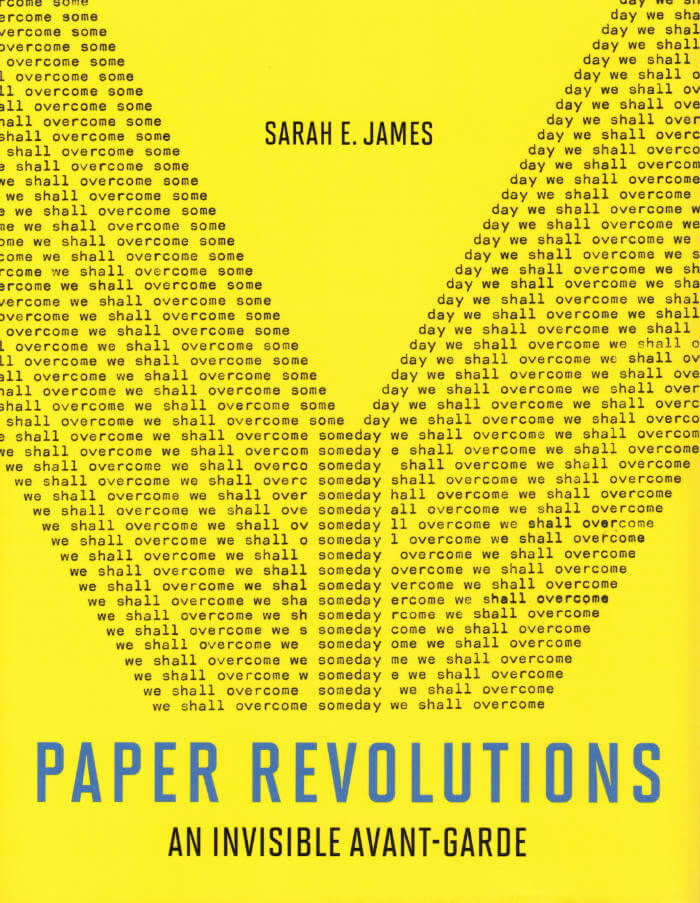
Paper Revolutions
The experimental practices of a group of artists in the former East Germany upends assumptions underpinning Western art's postwar histories.
In Paper Revolutions, Sarah James offers a radical rethinking of experimental art in the former East Germany (the GDR). Countering conventional accounts that claim artistic practices in the GDR were isolated and conservative, James introduces a new narrative of neo-avantgarde practice in the Eastern Bloc that subverts many of the assumptions underpinning Western art's postwar histories. She grounds her argument in the practice of four artists who, uniquely positioned outside academies, museums, and the art market, as these functioned in the West, created art in the blind spots of state censorship. They championed ephemeral practices often marginalized by art history: postcards and letters, maquettes and models, portfolios and artist's books. Through their “lived modernism,” they produced bodies of work animated by the radical legacies of the interwar avant-garde.
James examines the work and daily practices of the constructivist graphic artist, painter, and sculptor Hermann Glöckner; the experimental graphic artist and concrete and sound poet Carlfriedrich Claus; the mail artist, concrete poet, and conceptual artist Ruth Wolf-Rehfeldt; and the mail artist, “visual poet,” and installation artist Karla Sachse. She shows that all of these artists rejected the idea of art as a commodity or a rarefied object, and instead believed in the potential of art to create collectivized experiences and change the world. James argues that these artists, entirely neglected by Western art history, produced some of the most significant experimental art to emerge from Germany during the Cold War.
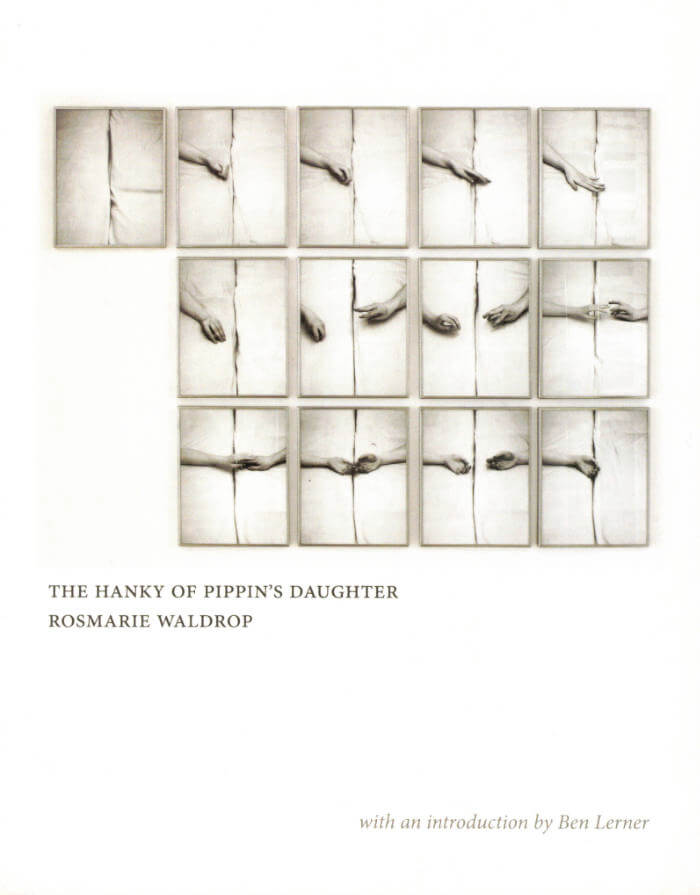
The Hanky of Pippin's Daughter
Poet Rosmarie Waldrop’s classic novel about the horrors and banalities of German life between the World Wars.
“Josef and Frederika Seifert made a bad marriage—he so metaphysical, she, furious frustrated singer, furious frustrated femme fatale, unfaithful within two months of the wedding day. The setting is small town Germany between the wars; the Seiferts are just those ‘ordinary people’ who helped Hitler rise, bequeathing their daughter, who tells their story, a legacy of grief and guilt. Rosmarie Waldrop’s haunting novel, superbly intelligent, evocative and strange, reverberates in the memory for a long time, a song for the dead, a judgment.” (Angela Carter)

Time has fallen asleep in the afternoon sunshine
Ik ben Elias of het gevecht met de nachtegalen, door Maurice Gilliams
For the project Time has fallen asleep in the afternoon sunshine a group of people/ performers memorize a book of their choice. Together they form a library collection consisting of living books. After years of learning by heart and reciting for readers, some of the books have now been written down from memory to create new editions, versions resulting from this process. This book is one of those books, chosen by one person, learned by heart and recited many times, and now written down again from memory. This edition is not a re-edition of the original text. It is a re-writing of the text after the process of reading, memorizing and reciting, with all the alterations that might have occured in the course of this process.

The Soft Layer
A performance text by Jozef Wouters, The Soft Layer traces and proposes visions and words that enfold the historic building of Dar Bairam Turki in Tunis like a cloak. How can we imagine possible futures for such a place and the community inhabiting it, beyond nostalgia and the spectres of the past? Several voices muse in three languages (Tunisian, French and English) on renovation and history, destruction and cleansing, the limits of science-fiction and the soothing quality of aloe vera.
Published by Varamo Press in the essay series Gestures
First edition May 2022
48 pages, 11.0 x 16.5 cm, sewn perfect binding
ISBN 978-82-691492-4-1

In Perpetuity
In Perpetuity is part of Ivey Wawn’s project of the same name. With contributions from those involved in the making of what would have been the live performance, it is an accumulation of thoughts, reflections and associated pieces of work that give some idea of what the work could, would, or may in the future come to be.
In Perpetuity is an ongoing project that has taken a variety of forms, from publication, through video and into live performance.
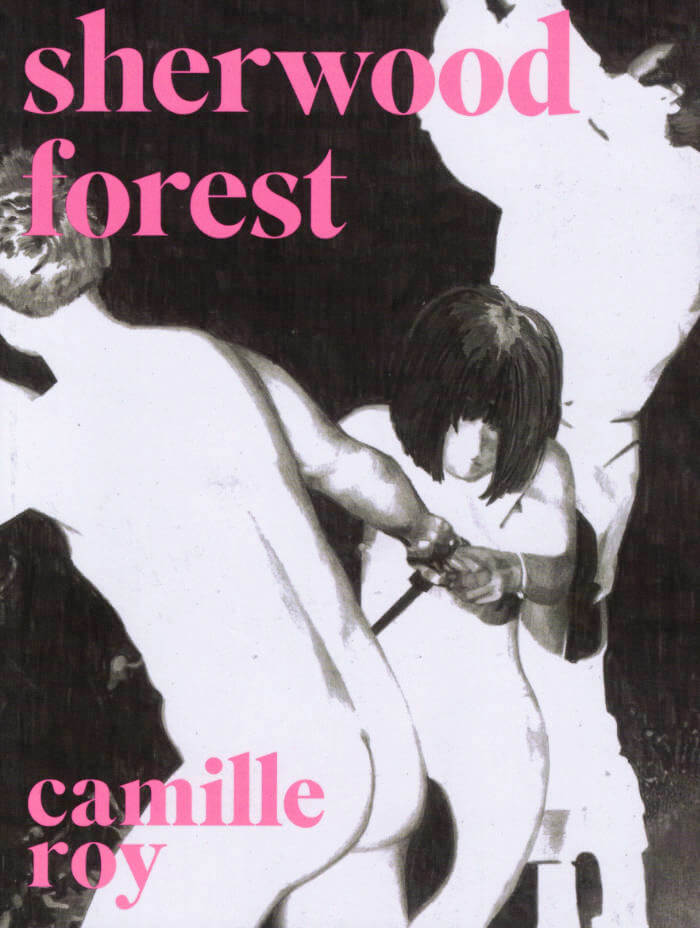
Sherwood Forest
The forest is a place of refuge and story, created by characters who enter and enlarge it beyond the fantasy of any one person. Authority is diminished and recuperated. Personalities perform themselves via vivid and anarchic gestures. A condition of dereliction becomes the arena where bodies rustle with erotic pulse.
"My hope was that this book would be entered as its own social space. Like a gay bar of the fifties, entry would signal that you have taken membership in a stigmatized community, with the risk that entails. Can readership entail risk? Readership as a secret society."—Camille Roy

What Is Poetry? (Just Kidding, I Know You Know)
A selection of interviews and rare photos from the legendary St. Mark's Poetry Project for its 50th anniversary season.
The Poetry Project at St. Mark's Church was founded in 1966 for the overlapping circles of poets in the Lower East Side of New York. These interviews from The Poetry Project Newsletter form a kind of conversation over time between some of the late 20th century's most influential poets and artists, who have come together in this legendary venue over the past 50 years.
Includes interviews with Charles North, Anne Waldman, Bernadette Mayer, David Rattray, Allen Ginsberg, Kenneth Koch, Harryette Mullen, Barbara Henning, David Henderson, Lisa Jarnot, Alice Notley, Ed Sanders, Samuel Delany, Harry Matthews, Victor Hernandez Cruz, Renee Gladman, Lorenzo Thomas, Fred Moten, Stan Brakhage, Alex Katz, Lewis Warsh, Ron Padgett, Maggie Nelson, Wayne Koestenbaum, Eileen Myles, and more.
"I find it one of the liveliest points of communication in the American poetry world. There is an incredible excitement to come to the church and read one's poems to the many other poets who congregate there, drawn to the church by its own energy and thrust."—Donald Hall
From the introduction, by Anselm Berrigan: "For the poets closely involved with the Poetry Project since, and subsequent to, its inception, the interviews were an opportunity to speak directly to a community one could perceive as known, imaginary, expanding, unwieldy, intermittent, formative, desperately necessary, and sometimes peculiarly unsatisfying all at once. Community being the kind of term that often implies everything and nothing simultaneously, with the bottom falling out of the word depending on who happens to be wielding it. Poets can be particularly adept at using and exposing such terms."

The Rosy Medallions
"If a book can be yummy & brilliant, of course this is that. Reading THE ROSY MEDALLIONS I felt I had come upon a world with so many insides, moments forged, then strewn, by an alienated pleasure seeking 'I.' This author's perspective ranges back and forth over her life and memories like a hungry camera, doggily attracted to instances of beauty, cruelty and aeons of female privacy. Camille Roy's a pioneer in the new literature which used to be called autobiography, poetry, theater, prose or even the essay. See all their walls submissively crumble on her trek towards a gaudy piecemeal something resembling truth for the new dark ages and some light at the end of the tunnel"—Eileen Myles.
[These copies are from the original print from 1995. Some of them have damaged covers, mostly scratched ink. The insides are in perfect condition. No bend corners.]

DOMMAGE#1
Edition of drawings, paintings and scans by Sophia Hamdouch, wrapped in a vinyl sleeve.